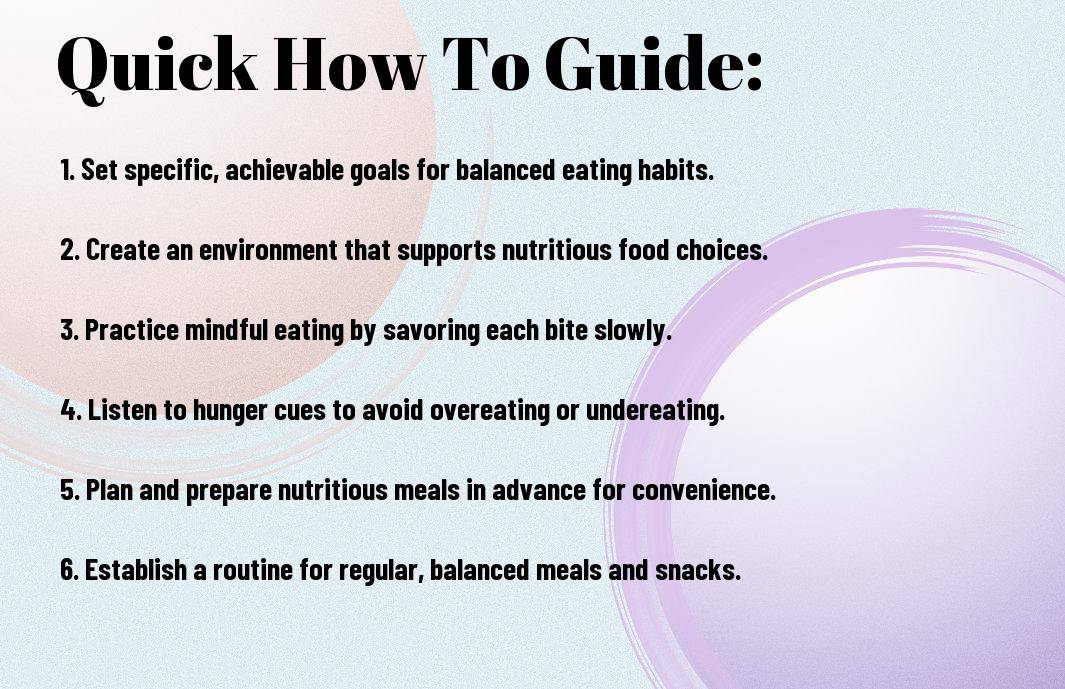Nutritional health is crucial for overall well-being, and a significant aspect of this is practicing mindful eating. In this blog post, we will explore how you can use the principles of Atomic Habits to cultivate healthy eating practices and transform your relationship with food. By adopting small, sustainable changes and establishing mindful habits, you can improve your nutritional health and well-being significantly.
Key Takeaways:
- Start small: Begin with tiny habits like eating one extra serving of vegetables per day to eventually make healthier choices a natural part of your routine.
- Be mindful: Practice mindful eating by paying attention to your food, savoring each bite, and listening to your body’s hunger cues.
- Environment matters: Rearrange your kitchen to make healthy foods more visible and accessible while placing tempting treats out of sight.
- Set clear goals: Define specific, measurable objectives for your nutritional habits, such as drinking a certain amount of water each day or reducing sugary snacks.
- Track your progress: Keep a food journal or use a tracking app to monitor your eating habits and identify areas for improvement.
- Build a support system: Surround yourself with people who encourage your healthy eating goals and seek out resources like nutritionist advice or cooking classes.
- Celebrate victories: Acknowledge and reward yourself for achievements in your nutritional journey, whether big or small, to stay motivated and committed.

Preparing for Mindful Eating
Setting the Stage for Change
There’s a saying that goes, “failing to prepare is preparing to fail”. Concerning mindful eating and improving your nutritional health, this saying holds true. Setting the stage for change involves creating an environment that supports your journey towards healthier eating habits. This could mean decluttering your kitchen, stocking up on nutritious foods, and even setting aside dedicated meal times.
Identifying Your Nutritional Goals
Even before begining on any dietary changes, it’s important to identify your nutritional goals. What do you hope to achieve through mindful eating? Do you want to lose weight, improve your energy levels, or simply feel better overall? Understanding your goals will guide your decisions and keep you focused on the path to better health.
Understanding your nutritional goals is crucial as it helps you tailor your eating habits to meet your specific needs. Whether you aim to cut down on processed foods, increase your intake of fruits and vegetables, or balance your macronutrients, having clear goals will make it easier to make informed choices when it comes to your diet.

How-To Establish Nutritious Eating Habits
Start with Tiny Changes
Keep in mind that when it comes to establishing nutritious eating habits, small changes can lead to big results over time. Start by incorporating small changes into your daily routine such as adding a serving of vegetables to your lunch or swapping out sugary snacks for fruits. These tiny adjustments may seem insignificant on their own, but they can have a powerful cumulative effect on your overall health.
Tips for Making Habits Stick
HowTo establish nutritious eating habits that stick? One key factor is consistency. To make your new habits stick, it’s important to create a routine and stick to it. Set specific goals for yourself and track your progress. Another helpful tip is to find an accountability partner who can help keep you on track and provide support along the way. Consistency and support are imperative for making long-term changes to your eating habits.
- Consistency is key in forming healthy eating habits.
- Having an accountability partner can help you stay on track.
- The more you stick to your routine, the easier it becomes to maintain your nutritious eating habits.
Habits
In order to make your nutritious eating habits stick, it’s important to understand the science behind habit formation. Our brains are wired to seek out rewards, which can make it challenging to break old habits. However, by gradually replacing unhealthy habits with healthier ones and focusing on the positive outcomes of these changes, you can train your brain to prioritize nutritious eating.
- Focusing on the rewards of nutritious eating can help reinforce your new habits.
- The more you practice your new habits, the more automatic and effortless they will become.
- The key to making lasting changes is to consistently reinforce your new habits and stay committed to your goals.
Nutritious
In the matter of establishing nutritious eating habits, it’s crucial to pay attention to the quality of the food you consume. Focus on incorporating a variety of nutrient-dense foods such as fruits, vegetables, whole grains, lean proteins, and healthy fats into your diet. Avoid processed foods and limit your intake of added sugars and unhealthy fats. By prioritizing whole, nutritious foods, you can support your overall health and well-being.
Factors Influencing Nutritional Choices
Unlike other aspects of our lives, nutritional choices are influenced by a variety of factors. These factors can sometimes dictate what we eat without us even realizing it. Understanding these influences can help us make more mindful decisions when it comes to our diet.
Environmental Cues and How They Affect Eating Habits
With the rise of fast food chains and convenience stores on every corner, it’s no surprise that environmental cues play a significant role in our eating habits. The sight and smell of food as we go about our daily lives can trigger cravings and lead us to make unhealthy choices. Being aware of these influences can help us make conscious decisions about what we eat.
Emotional Eating and How to Navigate It
Eating in response to emotions is a common practice for many people. Stress, boredom, sadness, and even happiness can lead us to seek comfort in food. Learning to identify these emotional triggers and finding alternative ways to cope can help us develop a healthier relationship with food. Mindful eating practices and seeking support from loved ones or a therapist can be beneficial in navigating this emotional aspect of our eating habits.
Eating mindfully and being aware of our emotions when it comes to food can lead to a more balanced and healthy relationship with what we eat. Keep in mind, it’s okay to indulge occasionally, but it’s important to listen to our bodies and choose foods that nourish us both physically and emotionally.
Building a Mindful Eating Routine
After learning about Healthy Eating Habits Based on Science and Psychology, it’s time to examine into practical strategies to incorporate mindful eating into your daily routine. By building a mindful eating routine, you can enhance your nutritional health and overall well-being.
The Art of Savoring: Slowing Down Meal Times
Any meal can be transformed into a mindful experience by practicing the art of savoring. This involves slowing down during meal times, fully engaging your senses in the eating process. Take the time to appreciate the colors, textures, and flavors of your food. Chew slowly and savor each bite, allowing yourself to fully experience the taste and aromas. By slowing down and being present in the moment, you can cultivate a deeper connection to your food and enhance the enjoyment of your meals.
Tips for Mindful Selection of Food
While selecting food for your meals, it’s important to practice mindful awareness to make nutritious choices. Consider the following tips for mindful selection of food:
- Choose whole, minimally processed foods: Opt for fresh fruits and vegetables, whole grains, lean proteins, and healthy fats to nourish your body with crucial nutrients.
- Pay attention to portion sizes: Be mindful of serving sizes to avoid overeating and promote better digestion.
- Listen to your body’s hunger and fullness cues: Eat when you’re hungry and stop when you’re satisfied, tuning into your body’s signals of hunger and fullness.
Assume that by practicing mindful selection of food, you can make informed choices that support your nutritional goals.
Eating mindfully can lead to a healthier relationship with food and improved digestion. By incorporating these mindful eating practices into your routine, you can enhance your overall well-being and savor the nourishment of each meal.
Overcoming Common Barriers to Mindful Eating
Not sure where to start with mindful eating practices? Check out Mindful Eating | The Nutrition Source – hsph.harvard.edu for a comprehensive guide on how to incorporate mindfulness into your meals for better nutritional health.
Navigating Social Settings and Peer Pressure
If you find it challenging to practice mindful eating in social settings or feel pressured to stray from your healthy eating habits, remember that your well-being should always come first. Politely decline offers that don’t align with your goals and focus on enjoying the company rather than the food. Surround yourself with supportive friends and family who respect your choices and encourage your healthy habits.
Addressing Time Constraints and Busy Schedules
Eating mindfully can be particularly challenging when you’re juggling a hectic schedule. With work deadlines, family responsibilities, and personal commitments all vying for your attention, it’s important to prioritize self-care, including nourishing your body with wholesome meals. Take small steps like scheduling time for meals, preparing healthy snacks in advance, and focusing on eating without distractions to make mindful eating more manageable even on busy days.
Sustaining Nutritional Health Over Time
All successful journeys towards better health involve consistent effort over time. Sustaining nutritional health requires dedication and a commitment to your well-being. To ensure you stay on track with your goals, it is imperative to incorporate habits that will support your long-term success.
How to Track Your Progress Effectively
Progress tracking is a vital tool in maintaining your nutritional health. By monitoring your habits and their impact on your well-being, you can assess what is working well and what needs adjustment. Keeping a food journal, using a mobile app, or working with a health professional are effective ways to track your progress over time and make informed decisions about your nutritional choices.
Tips for Adapting Habits as Your Needs Evolve
Progress
As you continue on your journey to better nutritional health, it is imperative to adapt your habits to meet your evolving needs. Life changes, goals shift, and priorities adjust, so it’s important to be flexible and willing to modify your habits accordingly. Here are some tips to help you adapt your habits as you progress towards your nutritional goals:
- Listen to Your Body: Pay attention to how different foods make you feel and adjust your choices accordingly.
- Stay Informed: Keep up to date with the latest nutrition research and guidelines to make informed decisions about your diet.
- Seek Support: Surround yourself with a supportive community or seek professional help when needed to stay on track with your nutritional goals.
Thou, by staying mindful and adaptable, you can sustain your nutritional health over time and continue to thrive in your well-being journey.
This
Sustaining nutritional health over time requires consistent effort and a willingness to adapt. By tracking your progress effectively and adapting your habits as needed, you can ensure that you are meeting your nutritional needs and supporting your overall well-being. Recall, the key to long-term success lies in maintaining a balance between consistency and flexibility in your approach to nutrition. Stay committed, stay mindful, and your efforts will pay off in the long run!
To wrap up
From above Five Lessons from the Book Atomic Habits You Can Apply Today, we have explored how the principles of atomic habits can be applied to improve our nutritional health through mindful eating practices. By focusing on making small, sustainable changes such as setting specific goals, designing our environment to support healthy choices, and tracking our progress, we can gradually build better eating habits that contribute to overall well-being.
Remember that forming healthy habits takes time and consistency, but by approaching our nutritional health with mindfulness and intention, we can make significant strides towards a healthier lifestyle. Let’s continue to apply the lessons from Atomic Habits to cultivate positive habits around our eating behaviors and forge a path towards better nutritional health for the long term.
FAQ
Q: What is mindful eating?
A: Mindful eating is a practice that involves paying full attention to the experience of eating and drinking, both inside and outside the body. It involves being fully present and engaged in the act of eating, removing distractions, and listening to your body’s hunger and fullness cues.
Q: How can mindful eating improve nutritional health?
A: Mindful eating can help improve nutritional health by promoting a better understanding of hunger and fullness cues, reducing overeating, and fostering a healthier relationship with food.
Q: How can I incorporate mindful eating into my daily routine?
A: You can incorporate mindful eating into your daily routine by eating slowly, savoring each bite, removing distractions such as TV or phones, and paying attention to the flavors and textures of your food.
Q: What are the benefits of practicing mindful eating?
A: The benefits of practicing mindful eating include better digestion, weight management, reduced emotional eating, increased enjoyment of food, and improved overall well-being.
Q: How can I break unhealthy eating habits with mindful eating?
A: You can break unhealthy eating habits by practicing mindful eating, being aware of triggers that lead to unhealthy eating patterns, and implementing new, positive habits that support your nutritional health goals.
Q: Can mindful eating help with portion control?
A: Yes, mindful eating can help with portion control by allowing you to tune in to your body’s hunger and fullness cues, which can prevent overeating and promote eating until satisfied, not stuffed.
Q: How can I stay consistent with mindful eating practices?
A: You can stay consistent with mindful eating practices by setting realistic goals, practicing self-compassion, being patient with yourself, and seeking support from a nutritionist or counselor if needed.



